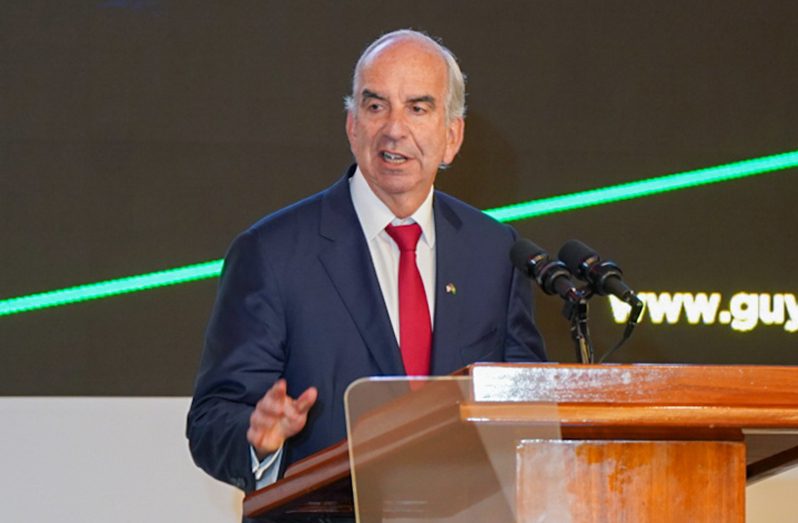–Hess CEO says
GUYANA has a unique opportunity to become a role model for oil-producing and developing countries around the world, as nations forge ahead with various energy- transition initiatives, Chief Executive Officer (CEO) of the Hess Corporation, John Hess, has said.
In his address to participants at the second annual International Energy Conference and Expo at the Marriott Hotel, Hess said in discussing energy realities it is important to examine the crucial role Guyana is going to play in ensuring an “orderly” energy transition.
“Oil and gas will be needed for decades to come…. and oil and gas are fundamental to ensure an affordable, just and secure energy transition.
“President [Dr. Irfaan] Ali has been an outstanding spokesperson on this subject and the important role that oil and gas play in bringing shared economic prosperity to the people of Guyana, and in providing the much-needed oil that is essential for global energy security and economic growth around the world,” Hess said.
Based on widely reported information, the world faces a massive “dual challenge,” in which it requires approximately 20 per cent more energy by 2050, while at the same time having the aspiration to get to net zero greenhouse gas emissions.
Hess said that while the International Energy Agency (IEA) in its World Energy Outlook offers three scenarios, it is not a forecast.
“I have to make clear these are scenarios not a forecast. Sometimes people misunderstand that and it’s how we meet this dual challenge in all three of the IEA scenarios. The world is facing a structural deficit and energy supply…it’s really important to get a reasonable estimate for what investment is going to be required to meet this dual challenge,” he said.
In terms of oil and gas, according to Hess, over the next 10 years the world has to spend US$500 billion each year to ensure that global oil-and-gas efforts intensify to meet the demand.
However, for the last five years, the number has been between US$300 billion and US$400 billion, way short of what is needed.
Further, amidst those shortfalls, it is also important to take note of the significant amount of funds needed to transition to clean energy.
Business leaders and government officials must have a sober understanding of this investment challenge, especially since capital is becoming scarcer and more expensive in the current financial environment.
“The reality is that the energy transition is going to take a very long time, cost a lot of money and need many technologies that don’t exist to them. And to have that orderly energy transition, policymakers must have climate literacy, energy literacy and economic literacy,” the CEO stressed.
In the room filled with energy experts and policymakers, Hess urged that a balance among those three issues is key for the sector.
“It’s not just climate, It’s not just energy. It’s not just economic, it’s all three together,” he advised.
Specific to Guyana, while acknowledging this process has already started, Hess reiterated that responsible development of this country’s oil-and-gas resources is fundamental to its future, especially to meet the world’s growing energy needs.
He related that Guyana has already started to track this course through the recent signing of an end-user agreement in carbon credit sale to HESS Corporation.
In December, Guyana signed a multi-year agreement with Hess Corporation for at least US$750 million.
“Hess Corporation is honoured to play a very key role in helping build Guyana’s oil-and-gas industry… and to be making some of the important investments and reliable low-cost oil and gas supply that will be needed to meet future demand in the world,” Hess said.
He told the attendees that Guyana has made tremendous progress since the first-oil discovery in 2015.
Now with more than 30 discoveries on the Stabroek Block, Hess said this underpins a gross, discovered, recoverable resource estimate of more than 11 billion barrels of oil equivalent.
“It is a remarkable achievement that the country is already producing more than 380,000 barrels a day of some of the highest value lowest carbon crude oil in the world, with a line of sight to be producing over 1.2 million barrels a day by 2027.
“At that point, Guyana will become one of the largest crude oil producers in the world. And I think that’s a remarkable achievement,” Hess said, noting that while still very capital-intensive, renewable energy must be pursued.



.jpg)








